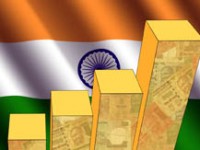Washington, Apr 5: With a record 35 percent Indians saying the national economy was getting worse, India's sputtering economy will undoubtedly be a major issue in the country's month-long election starting Monday, according to a US poll.
 Suggesting that "Indians' economic optimism all but evaporated in 2013", leading US pollster Gallup said Friday "Indians' growing pessimism about their economy is likely an ominous sign for the long-governing Congress party".
Suggesting that "Indians' economic optimism all but evaporated in 2013", leading US pollster Gallup said Friday "Indians' growing pessimism about their economy is likely an ominous sign for the long-governing Congress party".
"The economy is a major issue for many Indians, and the slowing GDP growth rates have led many analysts to conclude that the dominant Congress party is doomed, probably in favour of the opposition BJP (Bharatiya Janata Party)," it said.
To that end, an unnamed senior BJP leader was quoted as saying that the party will "have to re-establish confidence of both Indian and international investors in the Indian economy".
"But no matter who controls the lower house of India's parliament in May, they will need to restore the confidence of the millions of Indians who believe their economy is headed in the wrong direction," Gallup said.
The politically important southern region of India shows more economic vitality compared with other parts of the country, with 38 percent of Indians living there saying the national economy is getting better, the pollster said.
But with about half of those living in the South (45 percent) believing the economy is staying the same or getting worse, the Congress party may struggle to retain its electoral dominance there, Gallup said.
Just 9 percent of Indians in in the North believe their national economy is improving, while a firm majority (65 percent) say things are getting worse -- the highest percentage in any region.
Indians living in the East are the most optimistic about the status of the national economy, with 52 percent saying it is getting better.
Indians' diverging views on the economy help at least partially explain the differing levels of approval -- or disapproval -- for outgoing Prime Minister Manmohan Singh, Gallup said.In 2013, fewer than three in 10 Indians approved of Singh (27 percent), while 40 percent disapproved.
His approval is weakest in the struggling North (14 percent) -- a steep drop from his 2012 approval rating of 38 percent in that region.
Adding to the nation's economic difficulties, about half of Indians believe it is a bad time to find a job in their local job market, Gallup said. Fewer than three in 10 (29 percent) say it is a good time to find a job.
Indians living in the more educated, service-based South are far more optimistic about the job market than Indians who live in other regions, with 53 percent of those living in the South saying it is a good time to find a job.
By comparison, 13 percent of Indians in the North say it is a good time to find a job.Gallup said its survey results are based on face-to-face interviews with 3,000 adults, aged 15 and older, conducted in September-October 2013 in India. The maximum margin of sampling error is ± 2.2 percentage points.





Comments
Add new comment